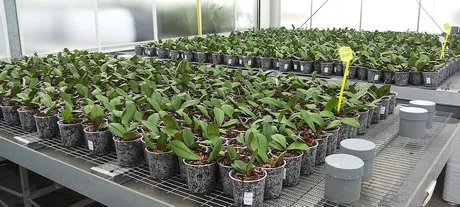
In the research three treatments will be carried out:
- At the first treatment a portion of the fertiliser will be added as controlled release at the start of the growing and the other fertilisers will be added with the watering. The drain water will be recycled in order to examine if, with the use of controlled release fertilisers, the emission of fertiliser will go down.
- With the second treatment the fertiliser will be added as controlled release fertiliser at the start of growing and watering will take place with clean water. The drain water will not be recycled. The aim here is to see how far the emission can be reduced for companies which cannot recycle their water yet. All the water that falls beside or between pots on the mesh bottom will go to the environment as clean water and orienting field trials will show if the leaching from the bottom of the pots also will be reduced.
- The third treatment is a control treatment without controlled release fertiliser or recycling of the drain water.
